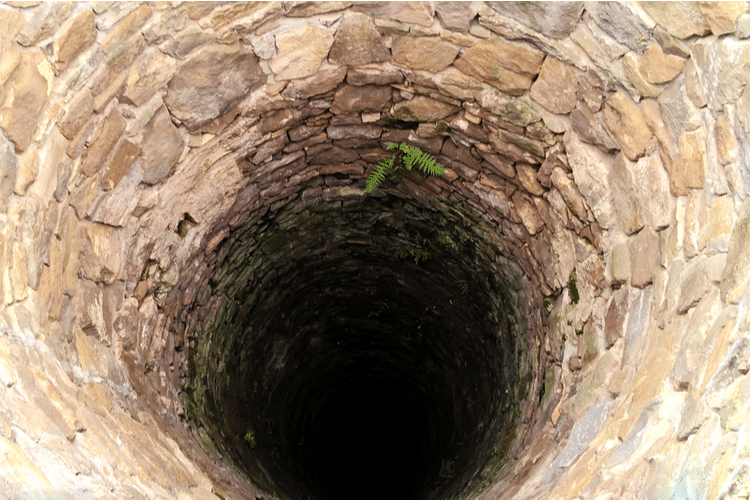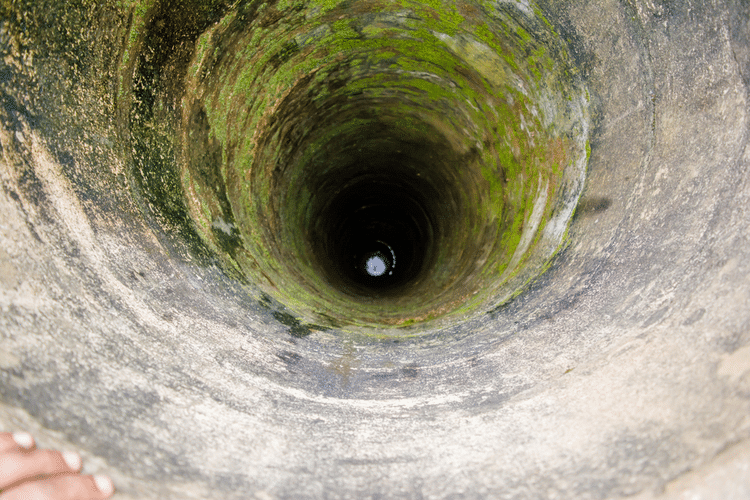First-time well owners often ask the question, does well water run out? Well water can run out mainly due to improper management or natural phenomenon.
Well water can run out permanently, but this is not common.
What Causes a Well To Run Dry?
A well can run dry because of reduced precipitation, low water levels, high water consumption, water leaks, sandy soil, and well infill. These causes can be due to well mismanagement or natural factors.

Numerous reasons can cause a well to run dry. Here are some of these factors:
1. Reduced Precipitation
Well water comes from various sources. These sources include precipitations such as rainfall, snow, sleet, drizzle, hail, and small ice pellets.
Decreased precipitation leads to less underground water, and consequently, you will experience water reduction.
2. Lowered Water Level
Extended drought will shrink the natural water supply, lowering the groundwater levels. In addition, numerous wells in a certain location can lower the water table.
Let’s assume you have a well that is producing water very well. But all of a sudden, your neighbors install their wells for commercial purposes such as irrigation.
Soon you will realize that your well is not producing much water as it used to. The reason could be lowered water level due to many water wells and high water usage.
3. High Water Consumption
Does well water run out due to overconsumption? Yes, wells produce water at a certain speed. When the water usage is higher than the water production rate, your well will run dry.
4. Well Infill
Loose sediments and minerals can accumulate in your well over time. Too much sediment accumulation causes decreased water flow, or your well can stop producing water.
This issue mainly affects large families that require a lot of water for laundering, cleaning utensils, and frequent showers. Consistent use of water will significantly reduce well water levels.
5. Line Leak
Waterline leaks can lead to less water reaching you. Under the line, leakages are hard to notice or locate and continuously dissipate underground water levels.
Other factors that can cause your well to run dry include soil type and vegetation change. Sandy soils let quick water downward movement than rocky or clay soils. A well dug on rocky terrain will store water for an extended period than sandy soils.
Vegetation helps to reduce evaporation, hence more water retention. Besides, trees increase infiltration, recharging the groundwater.
How Long Does It Take for Well Water To Dry Up?
Water wells last up to 30 years. Mineral and sediments build up over the years, causing water output to decline.
The duration your well takes to dry up is dependent on the rate of sediment accumulation. The more sediment build-up, the quicker the water will dry up.
If you are getting less water from your older well, you need to call an expert to come and inspect your well.
Well deepening can help increase water yield in your well. New fractures emerge when you increase your well’s depth. The fractures contain more water, which will raise your well water levels.
How Often Does Well Water Run Dry?
Most water wells do not run dry often. With advancements in technology, modern water wells are so deep that they never run dry in their entire lifetime.
If your well runs dry due to prolonged drought, you will get water again once rainfall recharges the water table.

What Happens If Your Well Runs Dry?
When your well runs dry, there is decreased water pressure, sediments in the water, and sputtering faucets. As a result, your pump will be running, but no water will be drawn.
You can also experience the following when your well runs dry:
Change in Water Taste or Odor
If you experience a sudden or drastic change in water taste, you must carefully inspect your well. A pronounced odor requires check-ups.
Discolored Water
Discolored water is not fit for use, especially drinking. If your well water levels are very low, the pump can start pumping muddy water into the line.
This can contaminate your drinking water over time as the sediments coat the water line’s inner lining.
What Can You Do If Your Well Keeps Running Out of Water?
Here are some of the things you need to do when your well keeps running out of water:
1. Lower the Water Pump
In some cases, your pump might be above the current water level, especially if you use a submersible pump. To solve this issue, lower the water pump down to reach the new water level to enable it to draw water.
However, this won’t work for you if you use a jet pump. Also, this will not help if your well is not producing water at all, or it’s generating very little water.
2. Hydrofracture Your Well
Hydrofracturing or hydrofracking applies if your well gets water from aquifers. It involves eliminating sediments that block the fractures in your well. Once the fractures are unblocked, there will be a water flow increase in your well.
Most hydrofracturing processes increase water production by three gallons per minute. Unfortunately, there are instances when this technique doesn’t increase the water flow.
3. Deepen the Well
Drilling your well deeper allows you to reach into aquifers that have water. Water wells less than 50 feet deep are prone to water shortages.
If you drill some feet deeper, you will draw more and better quality water. The drilling technician will assess the location and advise you accordingly.
The technician can even extend your well casing to comply with the modern safety codes.
Before the drilling starts, the technician will clean the well to remove all debris inside. Note that drilling work is costly, more so in rocky terrain.
4. Replace the Well
Does well water run out? Your well can run dry if it’s older than several decades. The average well lifespan is 30 years, but other wells can supply water even when 50 years old.
If your water well is over 30 years old and runs dry, it is commendable to have a new well. Drilling another well allows you to correct the older well mistakes such as water production, storage tank capacity, and construction issues.
Drilling a new well is simple since there is no cleaning work or equipment removal. But the cost can increase depending on the required depth and the terrain.
Hi Scott! I found your article informative, but I am curious about what is considered a “modern well”?
My parents live in a house that was built in 1995 and I’m assuming that’s when the well was drilled. ( They don’t know for sure.)
Is that considered a modern well?
Since they live on a mountainside surrounded by trees, can they expect their well to last longer than 30 years, in your professional opinion?
Hi Betsy, thanks for reading. Yes, a well drilled in 1995 or anytime remotely close to that timeframe is what we should consider a modern well. The distinction was meant to be made about things from the long past, on the order of 100 years ago or longer.
It’s challenging to make any predictions about how long the water source for your particular well may last without actually studying the area carefully. There are more factors involved than just the slope and tree coverage. A local well drilling business or community discussions would be helpful, especially if you can compare with those that are relatively close by, have drilled to the same depth, and for the same length of time roughly.
Thank you for explaining how you can deepen the well to draw more water. I’ve been wondering what we may need to do to ensure that our well doesn’t dry up. I’ll be sure to keep this in mind if we ever notice any problems come up.
You were right to say that you could draw more water of higher quality if you drilled a few feet deeper. For his farm, my grandfather wants to drill a well. I’ll locate the water well drilling setup and suggest that he drill further for better-quality water.
It’s great to know that water wells would usually not run out, especially when there are advancements in technology that can actually dig deep into the ground. I wonder what the costs would be because we are interested to have a residential water well drilling installation on our property. Having another source can be helpful in reducing our monthly expenses in the long run, especially when there is inflation everywhere.